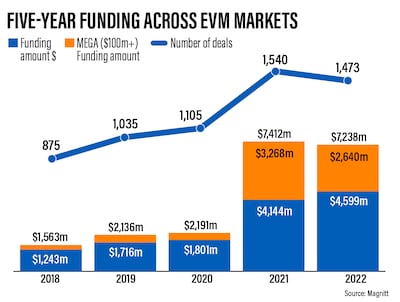Start-ups across the Middle East, Africa, Pakistan and Turkey raised $7.2 billion through 1,473 deals last year, despite macroeconomic and geopolitical uncertainty, according to a report by data platform Magnitt.
The funding value reduced by 2 per cent annually and was driven by a decrease in the value of late-stage mega deals, researchers said.
The number of deals recorded a faster decline of 4.4 per cent.
FinTech led both funding and number of deals in the MEAPT region, Magnitt data found. The sector's funding reached $2.25 billion across 351 deals in 2022.
The FinTech sector closed four out of the 13 mega deals in the region last year, which included Bahrain’s $110 million Rain deal and Saudi Arabia’s $100 million Tamara deal, the report said.
Funding for Mena start-ups crossed the $3 billion mark last year, an annual increase of 8.3 per cent, the researchers found.
“Our report reflected a strong first quarter for venture capital in the Middle East, Africa, Pakistan and Turkey. However, this was driven by the hangover of post-pandemic positivity, which distorted the delayed impact of global macroeconomic challenges and was not grounded in real-world sentiment,” said Philip Bahoshy, founder and chief executive of Magnitt.
“Funding and deal levels in emerging venture capital markets were quickly tempered by the slowdown that the global venture capital industry experienced as a whole, amidst a backdrop of economic uncertainty and geopolitical tension.”
Fears of a looming recession and spiralling inflation that drove the equities market rout globally have affected asset valuations in private markets, opening up new investment opportunities for venture capital investors, alternative assets industry data and analytics specialist Preqin said in a December report.
Entry valuations have reduced significantly and competition for deals has softened amid the global economic headwinds, it said.
Venture capital financing for start-ups in Mena rose 20 per cent annually to more than $2.3 billion in the first three quarters of 2022, putting it on track to potentially surpass the total investments attracted in 2021, Magnitt said in a separate report.
Turkey was the leading country in the MEAPT region in terms of start-up funding and deals, the report showed. It recorded 295 deals, followed by Nigeria with 198 deals and Egypt stood third with 160 deals.

Turkey captured 23 per cent of total funding, driven by three mega deals. The UAE was second, accounting for 16 per cent of funding, and Saudi Arabia followed with a share of 14 per cent, according to Magnitt.
The MEAPT region recorded 13 mega deals (worth more than $100 million), which accounted for 37 per cent of total start-up funding. Round sizes of more than $1 million shared around 25 per cent of the proportion.
While the number of mega deals was one less than in 2021, the value of these late-stage investments fell by 19 per cent, the report found.
“The tighter liquidity imposed by rising interest rates has made funding harder to secure for larger investments, leaving the $1 million to $5 million round size as the most attractive,” it said.
“Late-stage investment will be hard to come by in 2023 due to lack of liquidity in the market. We expect an increase in deal flow towards start-ups raising seed rounds or early series A as the sweet spot for potential investment.”
Start-up exits in the MEAPT region recorded a 36 per cent increase from 2021, with 144 exits closed in 2022. The Mena region accounted for 50 per cent of these exits.
“Valuations will return to pre-pandemic norms in 2023. The reduced availability of capital to fund an ever-increasing number of start-ups, combined with broader macroeconomic conditions, has and will continue to lead to the normalisation of start-up valuations,” Magnitt said.
“Countries with strong government support and policies like the UAE and Saudi Arabia will continue to see further funds and funds of funds deployed to support start-ups within their borders, while start-ups in geographies that do not have a focus on innovation in the current economic environment are likely to struggle.”


